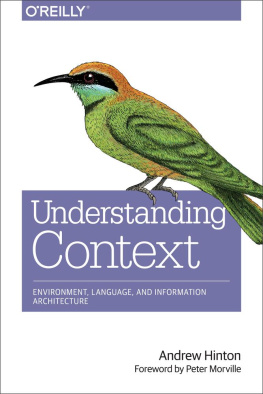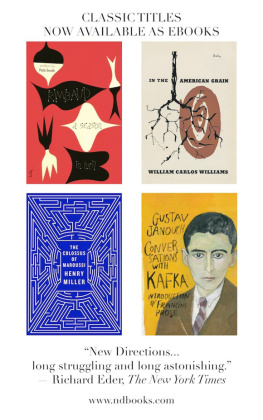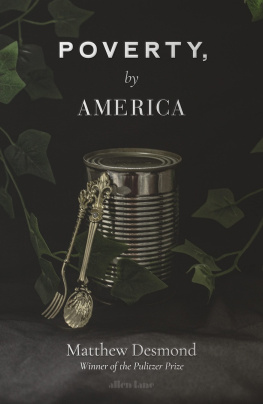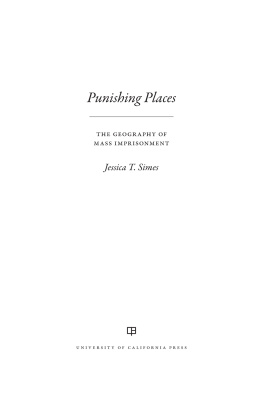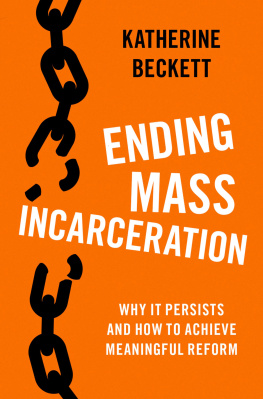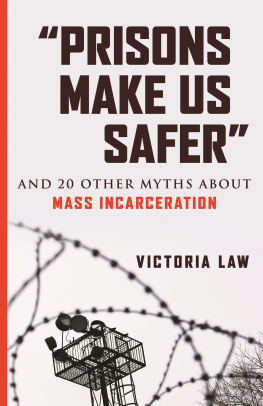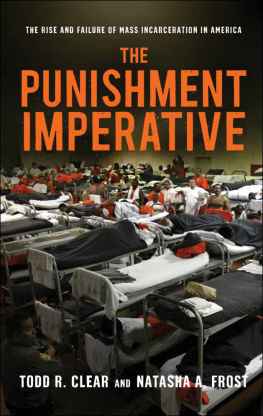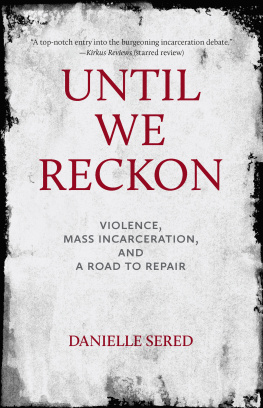Hinton - From the war on poverty to the war on crime: the making of mass incarceration in America
Here you can read online Hinton - From the war on poverty to the war on crime: the making of mass incarceration in America full text of the book (entire story) in english for free. Download pdf and epub, get meaning, cover and reviews about this ebook. City: Cambridge;Massachusetts;London;England, year: 2016, publisher: Harvard University Press, genre: Politics. Description of the work, (preface) as well as reviews are available. Best literature library LitArk.com created for fans of good reading and offers a wide selection of genres:
Romance novel
Science fiction
Adventure
Detective
Science
History
Home and family
Prose
Art
Politics
Computer
Non-fiction
Religion
Business
Children
Humor
Choose a favorite category and find really read worthwhile books. Enjoy immersion in the world of imagination, feel the emotions of the characters or learn something new for yourself, make an fascinating discovery.

- Book:From the war on poverty to the war on crime: the making of mass incarceration in America
- Author:
- Publisher:Harvard University Press
- Genre:
- Year:2016
- City:Cambridge;Massachusetts;London;England
- Rating:4 / 5
- Favourites:Add to favourites
- Your mark:
- 80
- 1
- 2
- 3
- 4
- 5
From the war on poverty to the war on crime: the making of mass incarceration in America: summary, description and annotation
We offer to read an annotation, description, summary or preface (depends on what the author of the book "From the war on poverty to the war on crime: the making of mass incarceration in America" wrote himself). If you haven't found the necessary information about the book — write in the comments, we will try to find it.
From the war on poverty to the war on crime: the making of mass incarceration in America — read online for free the complete book (whole text) full work
Below is the text of the book, divided by pages. System saving the place of the last page read, allows you to conveniently read the book "From the war on poverty to the war on crime: the making of mass incarceration in America" online for free, without having to search again every time where you left off. Put a bookmark, and you can go to the page where you finished reading at any time.
Font size:
Interval:
Bookmark:
FROM THE WAR ON POVERTY
TO THE WAR ON CRIME
The Making of Mass Incarceration in America
ELIZABETH HINTON

Cambridge, Massachusetts & London, England
2016
Copyright 2016 by the President and Fellows of Harvard College
All rights reserved
Publication of this book has been supported through the generous provisions of the Maurice and Lula Bradley Smith Memorial Fund.
Jacket image: Photo by Fred W. McDarrah/Getty Images
Jacket design: Jill Breitbarth
978-0-674-73723-5 (alk. paper)
978-0-674-96920-9 (EPUB)
978-0-674-96921-6 (MOBI)
The Library of Congress has cataloged the printed edition as follows:
Names: Hinton, Elizabeth Kai, 1983 author.
Title: From the war on poverty to the war on crime : the making of mass incarceration in America / Elizabeth Hinton.
Description: Cambridge, Massachusetts : Harvard University Press, 2016. | Includes bibliographical references and index.
Identifiers: LCCN 2015039012
Subjects: LCSH: Criminal justice, Administration ofPolitical aspectsUnited StatesHistory20th century. | Urban policyUnited StatesHistory20th century. | Crime preventionUnited StatesHistory20th century. | CrimePolitical aspectsUnited StatesHistory20th century. | ImprisonmentUnited States.
Classification: LCC HV9950 .H56 2016 | DDC 364.973dc23
LC record available at http://lccn.loc.gov/2015039012
For Big Papa
Since President Lyndon Johnson first called for a War on Crime some fifty years ago, prisons, jails, and law enforcement institutions have functioned as a central engine of American inequality. It is one of the essential ironies of American history that this punitive campaign began during an era of liberal reform and at the height of the civil
A new era of American law enforcement had begun, one that would soon
The capstone of Johnsons Great Society was the Safe Streets Act of 1968, which invested
The mission that the White House and Congress effectively assigned to the LEAA was to expand supervision and control in in the 1960s, then through the 1970s and beyond.
Although the Reagan administration is generally credited with spearheading the domestic policy shift toward confinement and urban surveillance, the national crime control programs it developed in the 1980s were hardly a sharp policy departure. The targeted deployment of such crime control programs in urban areas began during the civil rights era with John F. Kennedys total attack on delinquency in 1961. The Kennedy administrations antidelinquency programs were intended to provide low-income citizens in sixteen cities with counseling, job training, remedial education, and other social welfare programs as a strategy to prevent youth crime. Johnson expanded Kennedys intervention on a national scale and reframed it as a War on Poverty, while also introducing more aggressive and exhaustive supervision in the black urban areas previously targeted by the Kennedy administration. When Richard Nixon took office in 1969, he disinvested from his predecessors more progressive programs and seized upon the punitive impulses of Johnsons domestic policies, introducing draconian sentencing reforms, supporting the targeted deployment of aggressive local, state, and federal undercover police squads on the streets of American cities, and incentivizing prison construction. Roughly a decade into the crime war, as it became clear that the white youth in trouble were also entering the justice system at alarming rates due to the punitive climate generated by national law enforcement programs, Congress intervened to decriminalize certain offenses that policymakers associated with white children and teenagers. Simultaneously, new legislation placed the label potentially delinquent on any urban youth of color who had family members with arrest records, attended public schools, lived in public housing, or received welfare benefits. Shifting the purpose of the crime war from restoring law and order to ensuring domestic tranquility when he took office in 1974, Gerald Ford established urban policies that sought to rapidly process and confine targeted repeat offenders in jail for long terms. With a robust national law enforcement program under way at both the state and local levels, Jimmy Carter moved to dissolve the federal LEAA and place crime control measures at the center of the national governments broader urban policy, framing his punitive policies as security precautions, rather than crime control measures.
Relying on the strategies, institutions, and bureaucracy developed at the state and local levels during the War on Crimes first fifteen years, Reagan made the national law enforcement program far more punitive by the end of the 1980s. His administration brought to fruition some of the most controversial Waged over the past half-century, since it emerged from within the War on Poverty and alongside it, this long War on Crime has today positioned law enforcement agencies, criminal justice institutions, and jails as the primary public programs in many low-income communities across the United States.
In the century between the end of the U.S. Civil War in 1865 and Johnsons
The rise of mass incarceration over the past fifty years has disrupted millions of American families, nearly all of whom are low-income. However, policymakers decision to expand the punitive arm of the state has had especially severe consequences African Americans have in the long term been hit the hardest by the punitive transformation of domestic policy.
Regardless of socioeconomic status, African Americans are more likely to serve prison or jail time than any other racial group in the United States. Odds are 5050 that young black urban males are in jail, in a cell in one of the 1,821 state and federal prisons across the United States,
Arguably the most important question facing American society today is why, in the land of the free, one in thirty-one people is under some form of penal control. Scholars, activists,
The Federal Bureau of Investigation (FBI) provided a national portrait of these distorted figures in its Uniform Crime Rate, which has stood as the nations primary measurement of crime since 1930 despite its
A common account relies on party politics to explain why Johnson and other national representatives pursued this punitive domestic policy path. The story usually begins with the law and order rhetoric Barry Goldwater introduced into political
Electoral ambitions and special interests certainly help explain the federal governments commitment to enlarging the carceral state beginning in the mid-1960s, but Republican Party strategy is not a satisfactory answer alone. Without question, the rightward turn of the American political system played a role in the appearance
In addition to focusing too narrowly on the tactical dimensions of crime control politics, scholars have underestimated the federal governments active political candidates, and growing sectors of the public, national action is needed once again if we are to move toward solutions.
Most recently, political scientists and historians have begun to highlight the black politicians, community leaders, and clergymen who responded to disorder by demanding tougher crime control measures in urban communities. Their work has revealed new dimensions of surveillance in targeted low-income urban communities after 1965. These groups drew upon a long tradition of direct-action mobilization against police brutality and aggressive law enforcement that took on different approaches over the course of the 1970s and that continues to this day.
Next pageFont size:
Interval:
Bookmark:
Similar books «From the war on poverty to the war on crime: the making of mass incarceration in America»
Look at similar books to From the war on poverty to the war on crime: the making of mass incarceration in America. We have selected literature similar in name and meaning in the hope of providing readers with more options to find new, interesting, not yet read works.
Discussion, reviews of the book From the war on poverty to the war on crime: the making of mass incarceration in America and just readers' own opinions. Leave your comments, write what you think about the work, its meaning or the main characters. Specify what exactly you liked and what you didn't like, and why you think so.


